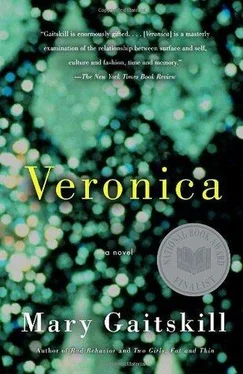Mary Gaitskill - Veronica
Здесь есть возможность читать онлайн «Mary Gaitskill - Veronica» весь текст электронной книги совершенно бесплатно (целиком полную версию без сокращений). В некоторых случаях можно слушать аудио, скачать через торрент в формате fb2 и присутствует краткое содержание. Год выпуска: 2006, Издательство: Vintage, Жанр: Современная проза, на английском языке. Описание произведения, (предисловие) а так же отзывы посетителей доступны на портале библиотеки ЛибКат.
- Название:Veronica
- Автор:
- Издательство:Vintage
- Жанр:
- Год:2006
- ISBN:нет данных
- Рейтинг книги:5 / 5. Голосов: 1
-
Избранное:Добавить в избранное
- Отзывы:
-
Ваша оценка:
- 100
- 1
- 2
- 3
- 4
- 5
Veronica: краткое содержание, описание и аннотация
Предлагаем к чтению аннотацию, описание, краткое содержание или предисловие (зависит от того, что написал сам автор книги «Veronica»). Если вы не нашли необходимую информацию о книге — напишите в комментариях, мы постараемся отыскать её.
Veronica — читать онлайн бесплатно полную книгу (весь текст) целиком
Ниже представлен текст книги, разбитый по страницам. Система сохранения места последней прочитанной страницы, позволяет с удобством читать онлайн бесплатно книгу «Veronica», без необходимости каждый раз заново искать на чём Вы остановились. Поставьте закладку, и сможете в любой момент перейти на страницу, на которой закончили чтение.
Интервал:
Закладка:
“Um-hm,” said my mother, and she gritted her teeth on her way out of the room.
But my father didn’t see my mother’s teeth. He was too charmed by Day singing “Bewitched.” He can laugh, but I love it. Although the laugh’s on me …
My father was right. If Jo Stafford sang that song, you would feel the pain of being laughed at by the one you love, and still you would love. When Doris Day sang it, the pain was as bright and sweet and harmless as her smiling voice. I’ll sing to him, each spring to him. And long for the day when I cling to him.… My father smiled and imagined being the one she painlessly longed to cling to; then he went home — to Jo. She sang, “But I miss you most of all, my darling,” and hurt was evoked and tenderly held and healed, again and again, in waves.
But eventually those feelings got attached to other songs, and those singers didn’t work as signals anymore. I remember being there once when he was playing the songs for some men he worked with, talking excitedly about the music. He didn’t realize his signals could not be heard, that the men were looking at him strangely. Or maybe he did realize but didn’t know what else to do but keep signaling. Eventually, he gave up, and there were few visitors. He was just by himself, trying to keep his secret and tender feelings alive through these same old songs.
I thought he was ridiculous. But I was only a kid. I didn’t see that I was making the same mistake. He thought the songs were who he really was, and I thought the new style suit was who I really was. Because I was younger, I was even more naive: I thought everything had changed forever, that because people wore jeans and sandals everywhere and women went without bras, fashion didn’t matter anymore, that now people could just be who they really were inside. Because I believed this, I was oblivious to fashion. I actually couldn’t see it.
I remember the first time I was made to see it. It was the first time I met a fashion model. Strangely, it was also one of the first times I saw someone for who she really was inside.
I was sixteen when this happened. I had run away from home, partly because I was unhappy there and partly because running away was what a lot of people did then — it was part of the new style. This style was expressed in articles and books and TV shows about beautiful teenagers who ran away even when their parents were nice; the parents just had to cry and struggle to understand. The first time I left, I was fifteen. My parents had fought and refused to speak to each other for three days; I slipped out through the silence and hitchhiked to a concert in upstate New York. United by my disappearance, my parents called the police, who picked me up in a shopping mall a week after I’d returned of my own accord. Daphne said that while I was gone, our mother acted like somebody on one of the TV specials about runaways — always on the phone talking to her friends about it. “I think she enjoyed it,” said Daphne.
But our mother said she did not enjoy it. “We won’t let you put us through that again,” she said. “If you leave now, you’re on your own. We won’t be calling the police.”
So a year later, I left again. I packed right in front of them. I said I would just be gone for the summer, but they assumed I was lying. “Don’t call here asking for money!” shouted my father. “If you walk out that door, you are cut off!”
“I would never ask you for money!” I shouted back.
“She thinks she won’t need it,” said my mother from the couch. “She thinks being pretty will make her way.” Her voice was angry and jealous, which made me think that leaving must be something great.
“She thinks she’s going to make her way in the world,” she said. But this time her jealousy was touched with wistfulness. She could’ve been talking about a girl in a fairy tale, walking down a path with her bundle on a stick.
I lived from apartment to apartment, sometimes with friends, sometimes strangers. I got a ride to San Francisco and stayed in a European-style hostel, where you could stay a limited number of nights for a fixed fee. It was a large dilapidated building with high ceilings and sweet, moldy drains. The kitchen cabinets were full of stale cereal, the kind with frosting or colored sweet bits made to look like animals or stars. You had to chip in for food staples. You weren’t supposed to bring in drugs; people did, but they were moderate and they shared. The man who ran it, a college student with a soft stomach and a big ball of hair on his head, even kept a record player in one of the common rooms, and we gathered there at night to share pot and listen to playful elfin songs about freedom and love. These songs had the light beauty of a summer night full of wonderful smells and fireflies. They also had a feeling of sickness hidden in them, but we didn’t hear that then.
For the first few days, I was one of two girls, the other being a little fifteen-year-old with suspicious eyes and a sexuality that was sharp and raw as her elbows. But she was with a boyfriend in his thirties, the kind of guy who put on airs about his clothes and manners even though he looked like shit. I tried to be friends with her, but she acted like I was beneath her, maybe because she had an older boyfriend who bought her dresses. The only time she was friendly with me was when she let me see her dresses, pulling them out of a canvas bag and laying them across her arm, smoothing them with her free hand and telling me where and how Don had gotten each of them for her. Otherwise, when we were in the kitchen with the others, she’d roll her eyes when I talked. The boys were nice to me, though; it was a treat for them to have a single girl around. Even the older boyfriend was secretly nice to me. He told me I’d be beautiful in ten years if I “cleaned up.” But in ten years, I thought, I’ll just be old.
Then a German woman came to the hostel. She was already old; she was thirty-one. But the boys were stunned by her. Even before they said so, I could tell. When she came in the room, they looked alert and dazed at the same time, like the beautiful night world of the music had appeared before them and begun swirling around their heads. When she left, they all said, “She is so beautiful!”
I didn’t understand; she just looked like a girl to me, only old. Then someone said, “She used to be a model,” like that explained everything. “She was very famous ten years ago,” he added.
The feeling of dazzlement increased. The next time she appeared, conversation stopped, and people were self-conscious about starting it again. The fifteen-year-old girl didn’t even try. She just sat there smoking and staring, not even suspicious anymore, like finally here was something that was exactly what it was supposed to be. She didn’t even care that her boyfriend was staring at this woman like he was in love with her. She looked at the model as if she were a glimmering set of dresses, like she’d drape her over her arm and stroke her if she could.
Every day, the German woman would walk into this reaction, eating her cereal, taking her turn at the toilet, sometimes joining in a smoke around the stereo. If she walked into the kitchen, carrying a book: What was she reading? Oh really! And what did she think of it? The German woman answered thoughtfully and pleasantly, but also stiffly, like she was trying to pass a test.
I still didn’t understand. I didn’t think she was beautiful and I didn’t care that she had been a model. This is probably hard to believe. It is hard for me to believe. Now everybody knows models are important; everybody knows exactly what beauty is. It is hard to imagine that a young girl would fail to recognize a former model with full, perfectly shaped features as beautiful. It wasn’t that I didn’t care about beauty; I liked beauty as much as anyone, but I had my own ideas about what it was. This woman didn’t look like anything to me. Now I would be staring at her like everybody else. But back then, I was the only person in the house who did not react to her appearance. The few times we were alone in the kitchen together, we made small talk, and I didn’t think she was paying me any more attention than I paid her.
Читать дальшеИнтервал:
Закладка:
Похожие книги на «Veronica»
Представляем Вашему вниманию похожие книги на «Veronica» списком для выбора. Мы отобрали схожую по названию и смыслу литературу в надежде предоставить читателям больше вариантов отыскать новые, интересные, ещё непрочитанные произведения.
Обсуждение, отзывы о книге «Veronica» и просто собственные мнения читателей. Оставьте ваши комментарии, напишите, что Вы думаете о произведении, его смысле или главных героях. Укажите что конкретно понравилось, а что нет, и почему Вы так считаете.












